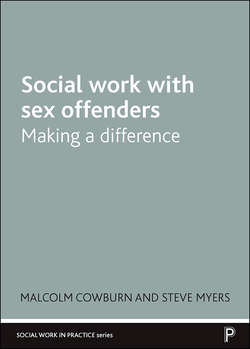Читать книгу Social Work with Sex Offenders - Cowburn Malcolm - Страница 23
На сайте Литреса книга снята с продажи.
Professional capacities to observe, to interpret and to act
ОглавлениеThe boundary between personal and professional lives is permeable; the impacts of work on interpersonal relations also affect relations with service users. This, however, changes as workers become more experienced. Farrenkopf’s (1992) ‘Phases of Impact’ model identifies four separate phases of adjustment. In the first phase, workers suffer from shock and feelings of vulnerability; they are unable to understand what they were hearing and feeling. In the second phase, workers are immersed in their professional task, characterised by non-judgemental work ethics, empathy for the sex offender and hope that their work will prove to be effective. In the third phase, repressed emotions re-emerge, particularly anger and resentment, leading to cynicism. The final impact phase is either negative, where workers become disenchanted with their task and their client group, or one of accommodation, where workers adopt less idealistic goals for their work.
Scheela (2001) suggests a six-stage ‘remodelling process’. The stages are: falling apart, taking on, tearing out, rebuilding, doing the upkeep and moving on. These phases capture how working with sex offenders initially challenges workers on both emotional and cognitive levels, but how through processes of change or adaptation, this is managed. These models are useful because they emphasise that worker reactions to working with sex offenders are not fixed, but change and develop through the acquisition of both knowledge and skills, and through developing appropriate support mechanisms.
In emotionally charged areas of social work, there is always an impact on the worker(s). The most serious consequence of this is that workers may not be able to engage with the difficult situation(s) they face (McFadden et al, 2015). This has recently been highlighted in cases where social workers have been found unable to engage with issues of sexual exploitation that have involved intra-racial sexual abuse (Jay, 2014; Bedford, 2015; Casey, 2015). This is a complex area that has ramifications across all of the chapters in this book. It relates to emotions, knowledge and values in practice.
